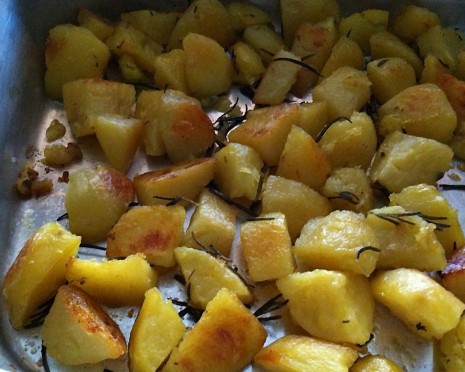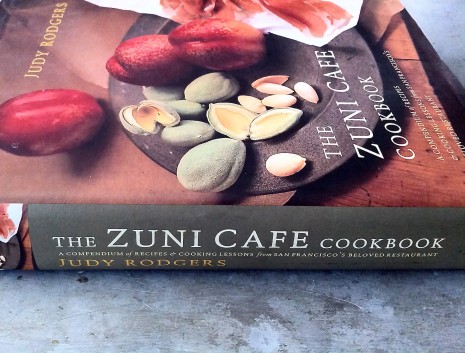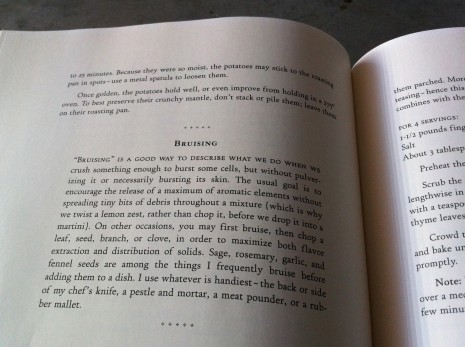RECIPE FOR HAPPINESS: ROSEMARY-ROASTED POTATOES FROM JUDY RODGERS
Last Monday’s sad news that Judy Rodgers, chef and co-owner of Zuni Cafe, in San Francisco, had died prompted an outpouring of heartfelt tributes. One that stood out in my mind was that in the Los Angeles Times by Jonathan Gold, who introduced me to Judy’s remarkable food back in 2001, on a research trip I took with my colleague (and Jonathan’s editor) at Gourmet, Nanette Maxim.
Nan and I had organized an ambitious, tightly orchestrated schedule packed with restaurants, vineyards, orchards, cheesemaking operations, farms, and markets, but we were on the home stretch by the time we connected with Jonathan and his wife, Laurie Ochoa, another member of the Gourmet family. It was a relief not to have an agenda, but simply a leisurely lunch with friends. Nan and I perused one of the most enticing menus in the world, then turned all the decision-making over to Jonathan and Laurie while we took in the convivial room. I don’t think I’ve ever felt at home faster in a restaurant.
In last week’s piece, Jonathan noted that Judy wasn’t first with urban rustic cuisine—that would be her mentor Alice Waters—nor the first to populate her wine list with obscure labels from Italy and the Rhone. “Her insistence on dry-brining was novel, but less sexy than liquid nitrogen or sous vide …. She was process-oriented, but had nowhere near Thomas Keller’s OCD-like obsession with detail …. Rodgers wasn’t constructing an alternate food universe like Corey Lee at Benu or Daniel Patterson at Coi, she was cooking dinner for you and your friends.”
I’ve been back to Zuni a number of times over the years, but my meal doesn’t deviate much from what I had that first time—house-cured anchovies with celery, Parmigiano-Reggiano, and olives followed by salt-rubbed chicken roasted in the massive wood-burning oven, then carved into enjoyably irregular serving pieces and nestled in a bread salad, moist with drippings and flavored with currants, pine nuts, and peppery or bitter greens. Dessert? Espresso granita with whipped cream. Signature dishes all, and the fact that they stay on the menu, along with other time-honored favorites (Caesar salad, the burger on foccacia, ricotta gnocchi, bowls of polenta and bean soup) without being tweaked beyond recognition has long been a gift to Bay Area residents and occasional visitors alike.
Judy was famous for her admonition, “Stop. Think. There must be a harder way.” But there is a big difference between finesse and fussiness, and like Judy herself, the food at Zuni never preened. “She was like one of those stage directors,” Jonathan wrote, “who knows that the best way to coax greatness out of her actors is to stand out of their way. And in her Zuni Cafe Cookbook, possibly the greatest, most generous cookbook ever written by a working American chef, she shared every technique she had.”
It is an extraordinary book, an important book, and if you don’t have a copy, you must rectify that immediately. The introduction and first chapter, “What to Think About Before You Start & While You Are Cooking,” alone are worth the price, for they will make anyone, whether novice or experienced, a better, more mindful cook.
“Well, I’ve looked at it,” a young foodie friend said sheepishly. “But I’m an eater, not a cook. I’m one of the reasons God made restaurants. And the recipes are so long.”
It is true that a number of them go on for pages. That doesn’t reflect their degree of difficulty, however, but rather the culinary knowledge they impart. And once you stop looking and start reading, odds are you’ll be hooked in no time, for Judy was a graceful, nuanced writer. Not only did she have a very fine and finely tuned palate, she had the observational skills of an art historian (which she once intended to become) and a vocabulary to match. Gerald Asher, Gourmet’s longtime wine columnist, contributed wine suggestions, and his essays about pairing wines with cheese, salads, cured meats, and so on, provide yet another layer of texture and richness.
As do the headnotes—the bits of text that precede the recipes. Having written scads of them in my day, I’m a connoisseur, and the thought and care Judy gave them continues to inspire. The one that precedes the Zuni hamburger recipe, for instance, is more of an essay on the kind of meat you should buy (boneless beef chuck) and the reasons why you should then cut it into pieces and preseason it with salt for up to a day before grinding it yourself. In lesser hands, this would make me want to throw the book at a wall, but instead, it got me first to the meat counter and then into the kitchen. The foolproof recipe made me a convert not just to making burgers from scratch, but of preseasoning every piece of meat, poultry, or fish I cook.
But what about the damn potatoes, you’re thinking. Good lord, it’s about time I got to those. The reason I chose this recipe out of all the treasures in The Zuni Cafe Cookbook is because it is staggeringly simple, easy to work into your culinary repertoire, and very forgiving if supper is delayed for any reason. “There are only four ingredients,” my pal, still skeptical, said. “And the recipe is almost two pages!”
At least he wasn’t whining about having to turn the page. But still. “Just read it,” I replied, trying not to sound snappish. “Even y—anyone, really, can make this, and see? You get a handy note on the virtues of bruising herbs. You don’t even have to chop.”
That caught his interest. I left him parked on the sofa while I got dinner working, and he’s still there, reading Judy’s book.
Rosemary-Roasted Potatoes
From The Zuni Cafe Cookbook, by Judy Rodgers (W.W. Norton & Company, 2002)
Judy recommended a rich, yellow-fleshed potato such as Finnish, Bintje, or German Butterball [the latter is what I used here], but she goes on to say you can use Yukon Gold or even russets for this recipe. She also noted that at Zuni they usually prepared this recipe with olive oil, but in the winter, they substitute duck fat when serving the potatoes with poultry, or rendered beef fat (that’s a restaurant chef talking), to accompany beef.
For 3 to 4 servings:
A scant 1¾ pounds yellow-fleshed potatoes, peeled and cut into irregular 1- to 1½-inch chunks
Salt [use coarse]
A leafy sprig of fresh rosemary
About ¼ cup extra-virgin olive oil
Preheat the oven to 400º.
Place the potatoes in a 4-quart saucepan and add cold water to cover by a few inches. Salt liberally, stir to dissolve, and taste—the water should be well seasoned (we use a scant 1½ teaspoons sea salt per quart water). Bring to a simmer over high heat and stir again, then reduce the heat just to hold the simmer. Cook until the potatoes ares soft on the edges and tender inside, 6 to 12 minutes, depending on the variety of potato and exact size of chunks. Drain well. Taste. The potatoes should be perfectly seasoned and delicious already. Place in a bowl while still warm.
Strip a palmful of leaves from the sprig of rosemary, then smash and bruise them with the back of a knife blade [or a mortar and pestle] to release their perfume. Add them to the bowl of warm potatoes and drizzle with the olive oil to coat liberally. The slightly overcooked potatoes will both soak up and shed into the fat. Some of the edges or smaller pieces may even crumble, which will produce crunchy bits and pieces everyone will reach for.
Transfer the potatoes, clad in their potato-laden oil, to a wide, shallow roasting pan. (If roasting potatoes for a crowd, use more than one pan, rather than pile the potatoes.) Roast until golden, rotating the pan as needed so they color evenly, 20 to 25 minutes. Because they were so moist, the potatoes may stick to the roasting pan in spots—use a metal spatula to loosen them.
Once golden, the potatoes hold well, or even improve from holding in a 275º oven. To best preserve their crunchy mantle, don’t stack or pile them; leave them on their roasting pan.
Posted: December 10th, 2013 under favorite books, people + places, recipes, restaurants.
Comments
Comment from sylvie
Time February 21, 2015 at 11:07 am
Mum has fresh rosemary in her garden and she adds it in many, many of her dishes.
Regarding roasted potatoes, she usually adds fresh thyme but if your roasted potatoes bring to happiness, she should try once to replace thyme with rosemary!





Pingback from Food News Thursday, December 12 – Food News Journal : Food News Journal
Time December 12, 2013 at 8:46 am
[…] Ramen – Happyolks Lightly Salted Crunchy Almond Butter – Chocolate and Zucchini Recipe for Happiness: Rosemary-Roasted Potatoes from Judy Rodgers – Jane Lear 2013 Gift Guide: Day Seventeen – Ruth Reichl Dig Deep – Butter […]